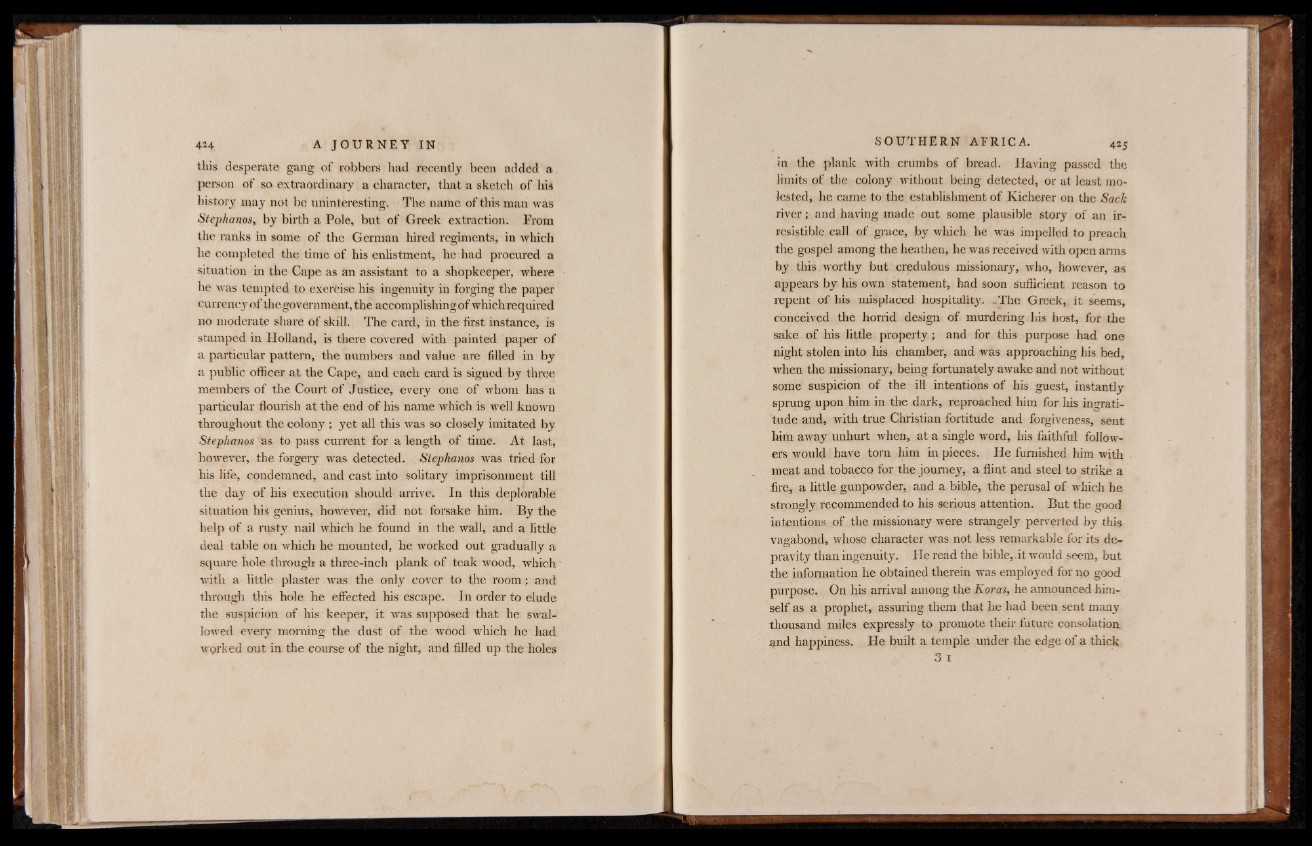
this desperate gang of robbers had recently been added a
person of so extraordinary a character, that a sketch of his
history may not be uninteresting. The name of this man was
Stephanos, by birth a Pole, but of Greek extraction. From
the ranks in some of the German hired regiments, in which
he completed the time of his enlistment, he had procured a
situation in the Cape as an assistant to a shopkeeper, where
he was tempted to exercise his ingenuity in forging the paper
currency of the government, the accomplishing of which required
no moderate share of skill. The card, in the first instance, is
stamped in Holland, is there covered with painted paper of
a particular pattern, the numbers and value are filled in by
a public officer a t the Cape, and each card is signed by three
members of the Court of Justice, every one of whom has a
particular flourish at the end of his name which is well known
throughout the colony ; yet all this was so closely imitated by
Stephanos as to pass current for a length of time. At last,
however, the forgery was detected. Stephanos was tried for
his life, condemned, and cast into solitary imprisonment till
the day of his execution should arrive. In this deplorable
situation his genius, however, did not forsake him. By the
help of a rusty nail which he found in the wall, and a little
deal table on which he mounted, he worked out gradually a
square hole through a three-inch plank of teak wood, which
with a little plaster was the only cover to the room; and
through this hole he effected his escape. In order to elude
the suspicion of his keeper, it was supposed that he swallowed
every morning the dust of the wood which he had
worked out in the course of the night, and filled up the holes
in the plank with crumbs of bread. Having passed the
limits of the colony without being detected, or at least molested,
he came to the establishment of Kicherer on the Sack
river; and having made out some plausible story of an irresistible
call of grace, by which he was impelled to preach
the gospel among the heathen, he was received with open arms
by this worthy but credulous missionary, who, however, as
appears by his own statement, had soon sufficient reason to
repent of his misplaced hospitality. .The Greek, it seems,
conceived the honid design of murdering his host, for the
sake of his little property; and for this purpose had one
night stolen into his chamber, and was approaching his bed,
when the missionary, being fortunately awake and not without
some suspicion of the ill intentions of his guest, instantly
sprung upon him in the dark, reproached him for his ingratitude
and, with true Christian fortitude and forgiveness, sent
him away unhurt when, at a single word, his faithful followers
would have torn him in pieces. He furnished him with
meat and tobacco for the journey, a flint and steel to strike a
fire, a little gunpowder, and a bible, the perusal of which he
strongly recommended to his serious attention. But the good
intentions of the missionary were strangely perverted by this
vagabond, whose character was not less remarkable for its depravity
than ingenuity. He read the bible,.it would seem, but
the information he obtained therein was employed for no good
purpose. On his arrival among the Koras, he announced himself
as a prophet, assuring them that he had been sent many
thousand miles expressly to promote their future consolation
and happiness. He built a temple under the edge of a thick
3 1